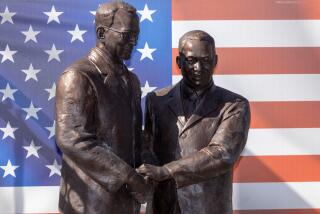Farrakhan Says Blacks Must Seize Real Power
- Share via
Nation of Islam leader Louis Farrakhan told an enthusiastic Los Angeles audience Monday night that it is time for blacks to “seize real economic power” and stop being “managers of the white man’s store.”
Interrupted several times by shouts and applause from the audience of more than 8,000 at the Convention Center, the controversial Black Muslim leader used his much-talked-about appearance to lash out at black politicians, especially Mayor Tom Bradley, who had opposed his coming here.
“The mayor of Los Angeles is a brilliant man,” Farrakhan told the largely black audience. “But the poor keep getting poorer . . . we’re slipping further and further behind. As long as we have a black man who is mayor of a great city . . . like Los Angeles . . . all we have is a black manager of a white man’s store.
“Until we have ownership in the store, we don’t have any equity position. . . .
“The black politicians give us a good feeling,” he said, “but when we look closer, there is a string coming out of their heads. . . . And over there, behind the door, is Edgar Bergen (the late ventriloquist) calling the moves.”
Farrakhan said that the blacks have been told by whites to get education, religion and political influence to achieve their goals. But, he added, “freedom is a long way off.”
“Weren’t we tickled when we saw Mayor Bradley become mayor of this great city?” he asked the crowd.
Responding to the hoots and jeers from the audience, Farrakhan replied, “I don’t say we’re tickled now.”
Farrakhan, who has been accused being racist and anti-Semitic, used the speech to reiterate his long-standing contention that he is neither.
“The more you get to know me,” he said, “(you will see) not a hater but a man who speaks the truth . . . truth that some people hate to hear. . . . Truth hurts those with guilt.”
As he warmed to his theme of black economic power, Farrakhan repeated his often-reported comments on Jews and their alleged influence over blacks.
“I’m not against the black-Jewish relationship,” he said. “I’m only questioning the quality of that relationship. We don’t want to forever be the tenants and they the landlords.
“We don’t always want to be the talent and they the movie moguls. . . . Some of that exploitation is like taking gold and diamonds out of South Africa.”
There was a minor verbal confrontation outside between Farrakhan’s supporters, who had come to hear him speak, and members of two Jewish organizations who taunted them. Police quickly and broke up the confrontation, with no arrests.
Before Farrakhan last spoke here, in September, 1985, local Jewish leaders, citing Farrakhan’s anti-Semitic remarks during the Rev. Jesse Jackson’s 1984 presidential campaign, called upon Bradley to repudiate the Black Muslim leader.
Local black leaders, who wanted Farrakhan to speak because they supported his economic programs, asked the mayor not to denounce him. Bradley chose to remain silent until after that speech.
During the 1985 speech before about 15,000 at The Forum in Inglewood, Farrakhan called Israel a “wicked hypocrisy” and said Jews “stole” Israel under Prime Minister David Ben Gurion, instead of waiting for their predicted coming of the Messiah.”
Although Bradley spoke out against Farrakhan the next day, the mayor’s silence before the Forum speech caused a furor in the local Jewish community.
Last July, using Respect for Life, a Black Muslim subsidiary that markets hair care and grooming products, Farrakhan reserved space for another speech, originally scheduled at the Convention Center on Aug. 8. This time, Bradley reacted quickly, calling on the city attorney’s office to find some way to break the Convention Center contract.
“I say to Mr. Farrakhan, and to anybody else, that statements of racial bigotry, racial hatred or religious hatred of any kind are unwelcome in the City of Los Angeles,” Bradley told a July 22 news conference.
All 11 members present at the July 22 City Council meeting signed a resolution opposing his appearance.
But attempts to invalidate the contract were abandoned after City Atty. James K. Hahn said that First Amendment guarantees of free speech would probably cause such efforts to fail.
Also contributing to this article were Times staff writers Andrea Estepa, Kirk Jackson and Curtis Taylor.
More to Read
Sign up for Essential California
The most important California stories and recommendations in your inbox every morning.
You may occasionally receive promotional content from the Los Angeles Times.













